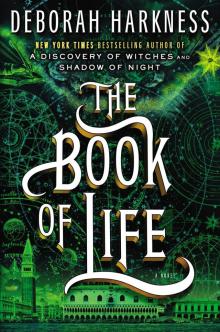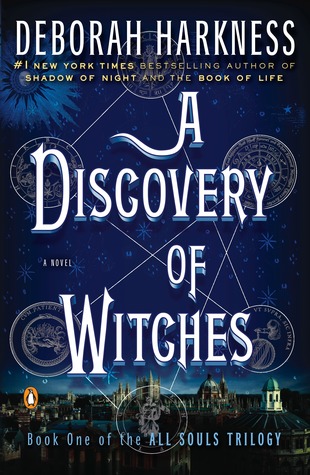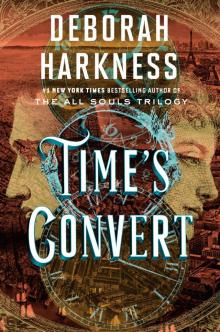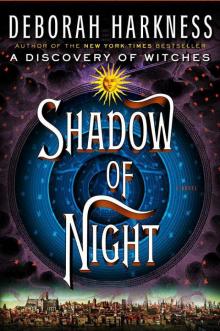- Home
- Deborah Harkness
Time's Convert Page 23
Time's Convert Read online
Page 23
MARCUS WAS WORKING alongside Bethlehem’s apothecary, Brother Eckhardt, in the small laboratory behind his shop facing the town square known as der Platz. Today the army’s wagons were moving from their riverside camp and through the town to their next destination, transforming an already busy thoroughfare into a public highway.
When he returned last night from the mill, Marcus had been told he would be staying with the Ettweins and sharing a room with John. De Clermont and Dr. Otto had undertaken a lengthy negotiation with Brother Ettwein to get Marcus removed from the Single Brothers’ House and away from the soldiers so that he did not unwittingly carry some contagion to the marquis’s bedside. Marcus’s new hosts were a pious family, and Brother Ettwein was not only the chief intermediary between the Moravians and the colonial army but also the town’s minister. This meant that the rafters echoed with both prayers and complaints. Marcus found the peace and quiet of the apothecary’s house soothing in comparison.
He stood at a clean wooden table with an array of pottery jars before him. Each one was labeled with its contents—mallow and almond oil and sal ammoniac. A bottle of spirit of lavender was at his elbow.
“That is not for Brother Lafayette,” Brother Eckhardt observed, studying the medicines on the table. He was a tall, elderly man with spindly legs, spectacles perched on a beak of a nose, and stooped shoulders, which gave him the look of a strange marsh bird.
“No. This is for Brother Andrew,” Marcus said, mixing some more oil into the brass bowl. “He was coughing last night.”
“Put some nightshade in it, too.” Brother Eckhardt handed Marcus another pot. “It eases spasms.”
Marcus took the pot, grateful for the advice, which he filed away for future reference. He had known Brother Eckhardt for only a few hours, but there was no doubt the man had a prodigious knowledge of medicines.
“A bit more mallow, too, I should think,” said Brother Eckhardt after giving the contents of Marcus’s bowl a good sniff.
Marcus added more dried pink flowers to the mortar and pounded them with the pestle.
“I will make some salve for Sister Magdalene’s hands, and you can take that to the mill when you go,” Brother Eckhardt said. “The bleach and soap she uses are very strong, and her hands crack and bleed.”
“I noticed.” Marcus had seen the evidence of hard labor on the woman’s skin. “Sister Magdalene doesn’t seem happy, washing for the soldiers.”
“Sister Magdalene is often unhappy,” Brother Eckhardt said mildly. “She has been since she arrived, I am told. She was a girl then, and sent here from Philadelphia by her master, who later freed her.”
“And Brother Andrew?” Marcus asked, his mind as busy as his hands.
“Andrew belongs to the Brethren,” Brother Eckhardt replied, “and is a member of our Congregation. He and Sister Magdalene were married some time ago. They are part of our community, and live and work alongside us under God.”
Alongside you, Marcus thought, going back to his work, but still not fully among you.
Marcus was troubled by the distance between the community’s language of brotherly love and equality and the fact that the Brethren owned slaves. It had bothered him in Hadley, too, and in the army, that men could espouse the ideals of liberty and equality in Common Sense and yet still treat Zeb Pruitt or Mrs. Dolly like they were lesser beings.
Shouts and a huge crash punctured the quiet of the laboratory.
“What was that?” Brother Eckhardt said, pushing up his spectacles. He ran outside, Marcus following.
A wagon had broken down outside the Sun Inn, just where the road began its descent toward the creek. The Brethren streamed out of houses, workshops, and barns to see what the fuss was about. The last remaining members of Congress stood outside the Sun Inn, surveying the damage. Even the chevalier de Clermont and the Marquis de Lafayette were there to witness the spectacle, thanks to La Brouette.
As Marcus and Brother Eckhardt drew closer, one voice could be heard above the noise of the crowd.
“I told you this would happen!” John Adams waved his arms in the air as he approached the listing wagon. “Did I not say you would need a team of oxen to safely move the statehouse bell down the hill, and stouter chains to stop the wheels? No one ever listens to me.”
“Should I take the marquis back to the Boeckels?” Marcus asked de Clermont. All of this excitement could not be beneficial for their patient.
“I fear that not even Adams and his oxen could pull Gil away,” the chevalier replied with a sigh. “Wait here. I’ll go see to the wagon. It will draw all the traffic to a halt, if left where it is.”
De Clermont joined the throng around the broken wheel. Marcus could see the chain that had done the damage, a length of it wrapped around one of the spokes and the rest of it lying in the road.
“I fear this is a bad sign,” Lafayette said mournfully. “First the crack. Now this. Do you believe in omens, Doc?”
“I do,” said a soft voice.
Marcus turned to find Brother Andrew standing at his elbow.
“I was taught to watch for them, when my name was Ofodobendo Wooma and I was still in the land of my fathers,” Brother Andrew continued. “Lightning and rain and the winds—these were all signs that the gods were angry and must be appeased. Later, when my name was York and I lived with a Jewish master on the island of Manhattan, he planned on selling me to Madeira in exchange for some wine. I prayed for deliverance, and one of the Brethren bought me instead and brought me here. That was a sign, too—of God’s love.”
Lafayette listened, fascinated.
“But I do not think this broken wheel should be counted among them, Brother Lafayette,” Brother Andrew said with a shake of his head. “God does not need to send his poor servants a message that we misjudged the weight of the bell. The broken chain is sign enough.”
“That is what Matthew said,” the marquis said, watching his friend argue with John Adams. Over by the wagon, tempers were fraying.
“Fetch Brother Ettwein,” Brother Eckhardt murmured to Brother Andrew. “Then go back to the mill. They will have need of you before this day is done.”
* * *
—
IT WAS TWILIGHT BEFORE MARCUS had an opportunity to take the medicines to Brother Andrew and Sister Magdalene. The area beside the creek was a hive of activity, even at this late hour, and the lamplight spilled through the windows and illuminated Marcus’s path.
The door to the millworks was ajar and Marcus craned his head around it, wanting to see what was going on inside. The sight that met his eyes was astonishing.
The chevalier de Clermont was working alongside Brother Andrew. His shirtsleeves were rolled up, displaying muscled forearms, and his dark breeches were covered in wood shavings. De Clermont’s skin was pale and smooth, unmarred by the marks of battle common to the soldiers Marcus treated. Not for the first time, Marcus wondered exactly what kind of knight the chevalier de Clermont was, with his craftsman’s skills and preference for the workshop rather than the tavern. The chevalier was a hard man to know—and an even more difficult one to understand.
“I think that’s straight,” the chevalier said, handing a spoke to Brother Andrew. “What do you think?”
Brother Andrew weighed the spoke in his hand and looked down the length of it with a practiced eye. He coughed as he drew the air of the mill into his lungs. “That will do, Brother Matthew. Shall I take them to the wheelwright?”
“Let Doc do it.” The chevalier de Clermont turned and motioned Marcus forward.
“I brought the liniment, Brother Andrew, and the tea,” Marcus said. “Brother Eckhardt made something to treat Sister Magdalene’s hands.”
“She is still down at the laundry,” Brother Andrew said. “I told her not to walk home unaccompanied. I will go—”
“No. I will go and escort Sister Magdalene home,
” de Clermont said. “The hill is too much for your lungs at present. Doc will make you some of his tea and then come straight back from the wheelwright and put some liniment on your back. By the time I return with Sister Magdalene, you will be as hale and hearty as the day you married.”
Brother Andrew laughed, but the laughter soon turned to spasms of coughing. Marcus and de Clermont waited in silence until the fit passed and the man was able to breathe again.
“I thank you, Brother Matthew,” Brother Andrew said, “for your kindness.”
“It is nothing, Brother Andrew,” de Clermont said with a bow. “I will return soon.”
Marcus poked at the fire and put the dented kettle on the stove to boil water. Once it was piping hot, he shook out some of the dried herbs from the packet of tea and set it to steep. He made sure Brother Andrew was comfortable and breathing more easily before trotting off with the bundle of wheel spokes. Marcus was saved from having to take them into town by some of the single brethren who were wheeling a metal hoop in that direction, no doubt to go around the new wheel that would carry the statehouse bell out of Bethlehem.
When Marcus returned to the mill, Brother Andrew was still coughing but the fits were less severe. Marcus poured some of the tea into the cup he’d noticed earlier. Brother Andrew sipped at it and his coughing abated further.
“This tastes better than most of what Brother Eckhardt makes,” Brother Andrew commented.
“I put mint in it,” Marcus explained, “just like Tom taught me.”
“And this Tom, he was your brother?” Brother Andrew eyed him over the cup.
“Just someone I knew once.” Marcus turned away.
“I think you are someone who has traveled far, and been known by many names,” Brother Andrew commented. “Like me. Like Brother Matthew.”
“The chevalier de Clermont?” Marcus was surprised. “I have never heard him called anything else, except for his Christian name Matthew.”
“And yet today he answered to Sebastien, when one of the German soldiers called out to him.” Brother Andrew sipped at his tea. “What other names do you answer to, Brother Chauncey?”
Somehow, Brother Andrew had divined that Marcus was not who he seemed to be.
“I answer to Doc,” Marcus replied, making for the door. “The liniment is on the table. Have Sister Magdalene warm her hands before she applies it. Twice or three times a day will help to ease the spasms as well as the tightness in your chest.”
“Once my wife answered to Beulah. Before that, she had another name—one her mother and father gave her.” Brother Andrew’s eyes were unfocused, as though he had forgotten Marcus was in the room. “When we were married, I asked for that name, but she said she no longer remembered it. She said the only name that mattered was the name she took when she was made free.”
Marcus thought of all the names he had gone by in his life—Marcus and Galen, Chauncey and MacNeil, Doc, and boy, and once even son. If he ever married, and his wife asked him his true name, which one would he share with her?
* * *
—
THE NEXT DAY, Bethlehem had returned to some semblance of its normal routine. Congress had left town, and the windows of the Sun Inn were flung open to air out the rooms. All of the wagons save one had moved on, along with most of the guards and the camp followers—except for Gerty, who had decided to stay in Bethlehem. Marcus had seen her outside the bakery, talking nonstop in her native language. Some of the brethren were already at work in the fields to the south of town, replacing the fence posts the soldiers had burned in their campfires and raking the manure left by the horses in the trampled buckwheat fields.
In der Platz, a small group of men were lifting the statehouse bell out of the broken wagon. The spokes that Brother Andrew and the chevalier de Clermont had been working on last night were not for a new wheel but a whole new wagon. How the Brethren had managed to construct it so quickly was a mystery. It stood next to the old one, waiting for its cargo.
Marcus watched as the men strained and struggled with the heavy load. Only one man seemed oblivious to the weight: the chevalier de Clermont. His grip on the bell never loosened, and no groans or complaints issued from his lips.
But it was not only the men who were participating in the work taking place in der Platz. A few of the sisters were assisting the process, adjusting ropes and darting to place another block under the wagon’s wheels to keep it steady. A group from the children’s choir stood nearby while their teacher explained what was happening, highlighting the mathematics and engineering that had been used to figure out the best way to transfer the bell from one wagon to another.
Brother Andrew kept a close eye on the new wagon as the statehouse bell was placed inside and the blocks were removed to allow its slow descent down the road to the creek. The brethren and sisters broke into spontaneous applause when the wagon started to move. Marcus joined them.
“Perhaps you will stay here, Liebling, and learn German?” Gerty smiled at Marcus, exposing the gaps where she was missing teeth. “I think you might enjoy life among the single brethren—for a time. Then perhaps you might court Sister Liesel, and start a family.”
For a moment Marcus considered what life would be like were he to leave the army and stay in Bethlehem, working alongside Brother Eckhardt in the laboratory, spending more time with John Ettwein, reading the books in the Gemeinhaus.
“To join the Brethren, you have to tell your life’s story and how you found God.” The chevalier de Clermont was standing only a few feet away, listening to every word.
A sense of danger surrounded the French soldier, as though de Clermont knew Marcus’s true name—and what had happened in Hadley.
“La!” Gerty waved her hand. “Doc will make something up. Something so full of sin it will satisfy even the Brüdergemeine. I will help you, Doc, by sharing some of my own life history with you.” Gerty gave him a salacious wink and strolled away.
“Stay with Dr. Otto and the army, Doc,” de Clermont advised. “They’re family enough.”
For now, Marcus thought. For now.
PART 2
’Tis Time to Part
Male and female are the distinctions of nature, good and bad the distinctions of heaven; but how a race of men came into the world so exalted above the rest, and distinguished like some new species, is worth enquiring into, and whether they are the means of happiness or misery to mankind.
—THOMAS PAINE
18
Fifteen
28 MAY
When Phoebe awoke on her fifteenth day as a vampire, she discovered that the world was somehow more sensual than it had been only the day before. The touch of silk on her skin was so arousing, so provocative, that she sought refuge in nakedness, shedding her nightgown so quickly that the straps broke and the seams tore.
That had been a mistake.
The breath of air that caressed her bare neck reminded her of Marcus. The feel of cool sheets took her back to his bed. But the softness of the pillow where she rested her cheek was a poor substitute for his familiar body.
Phoebe had taken a shower to cool down her heated thoughts, but it only made the throbbing between her legs worse. Her slippery fingers had dipped into her cleft to ease the pressure, but her mind would not be still, and her touch brought no relief. She picked up a bar of soap and threw it at the porcelain wall in frustration, unsatisfied.
It had been a very long day.
Françoise delivered a tray to Phoebe’s room shortly before midnight. On it was coffee, dark chocolate, and red wine—the only substances she could stomach at this point in her development besides blood.
“Soon, you will have to feed,” Françoise said as she slowly plunged the mesh filter down into the glass carafe. “And not on cat.”
Phoebe was riveted by the suggestive slide of metal against glass. It reminded her suddenly, sha
rply, of Marcus and sent a ripple of need through her body. Memories flooded her mind.
She was in her flat in Spitalfields. It was the first night Marcus had made love to her. He had been so gentle, never breaking the connection with her eyes as he slowly—so slowly—entered her. They hadn’t made it to the bed that first time, or the second.
Phoebe closed her eyes, but the heavenly scent of coffee set her mind racing down another of memory’s paths.
It was a warm, languid New Orleans morning in Marcus’s house on Coliseum Street. The aroma of chicory and coffee beans was a darkly bitter note in the bright air. Ransome had left them alone after regaling them with tales from last night’s business at the Domino Club. Marcus was still chuckling over one of the stories, a cup of steaming liquid before him, his fingers cool in spite of the heat, one hooked into the waist of the pajama bottoms she’d found in the chest of drawers. They were softly worn, the legs rolled up so that she wouldn’t trip on their length. Marcus added another finger to the first, both moving in a sinuous pattern on her lower back, and pressed a kiss to her damp neck in a promise of the afternoon pleasures to come.
Phoebe’s mouth watered. She swallowed, shifting in her chair.
“You need blood.” Françoise’s blunt voice broke memory’s spell.
“That’s not what I want.” Phoebe’s whole body was a single, focused ache. It originated in her core, from an empty place that could only be filled by another creature.
By Marcus.
“These feelings you are having, they are a sign that you are ready to take human blood,” Françoise said, lifting Persephone from her nest in the remains of Phoebe’s nightgown and depositing the cat on the armchair. Françoise picked up the tattered silk and tossed it in the laundry basket hidden in the wardrobe.
Insatiable lust is the sign that you’ve graduated to two-legged food? Phoebe’s dark eyes narrowed as she considered Françoise’s words, which usually carried hidden meaning.

 The Book of Life
The Book of Life Shadow of Night
Shadow of Night A Discovery of Witches
A Discovery of Witches The All Souls Real-Time Reading Companion
The All Souls Real-Time Reading Companion Time's Convert
Time's Convert The World of All Souls
The World of All Souls A Discovery of Witches: A Novel (All Souls Trilogy)
A Discovery of Witches: A Novel (All Souls Trilogy) Shadow of Night: A Novel
Shadow of Night: A Novel